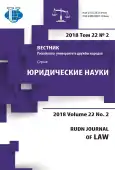Французская традиция арбитража
- Авторы: Жалламион К.1
-
Учреждения:
- Университет Монпелье Факультет права и политологии
- Выпуск: Том 22, № 2 (2018)
- Страницы: 289-306
- Раздел: ПРАВОСУДИЕ В РОССИИ И ЗАРУБЕЖНЫХ СТРАНАХ
- URL: https://journal-vniispk.ru/2313-2337/article/view/343859
- DOI: https://doi.org/10.22363/2313-2337-2018-22-2-289-306
- ID: 343859
Цитировать
Полный текст
Аннотация
Развитие института арбитража во Франции имеет длительную историю и имеет свое начало в римском праве. С начала возрождения последнего в XII в. Франция заимствовала большинство римских правил в отношении арбитража, и таким образом основывается на свободе воли сторон. В то же время постепенно проявляются и особенности французской модели, связанные главным образом с тем фактом, что решения арбитражей могли быть обжалованы в Парламенте. Посредством данного института король контролировал осуществление справедливого судопроизводства и начиная со Средневековья утверждал свою суверенную позицию в государстве. Разрыв с этой традицией произошел только в XVI в., когда канцлер Michel de L'Hospital сделал решения арбитражей между торговцами и членами одной семьи обязательными в целях сохранения их хороших отношений. Судьи, видевшие в этом сокращение их юрисдикции, не принимали реформ. Арбитраж стал инструментом борьбы между королем и судьями, что нашло отражение и в религиозных войнах, и позже в XVII и XVIII вв. Следующие изменения были спровоцированы Французской революцией. Законодатель стремился привлечь граждан к осуществлению правосудия и развивал институт арбитража, как инструмент, отличающийся от традиционной юстиции. Наконец, приход к власти Наполеона Бонапарта и принятие Гражданско-процессуального кодекса означили собой третий поворот в развитии института. Император значительно изменил право и стремился реорганизовать юстицию наилучшим образом, чтобы восстановить доверие к институту. Арбитраж таким образом был нивелирован как более низкий по качеству инструмент, как не предоставляющий достаточных гарантий для сторон. Лишь оживление международной торговли в Европе в конце XIX в. привело к возвращению использования института арбитража, благосклонному отношению к нему власти и судей.
Об авторах
Карин Жалламион
Университет Монпелье Факультет права и политологии
Автор, ответственный за переписку.
Email: publishing@rudn.ru
профессор истории права, Университет Монпелье, Факультет права и политологии
34060, Монпелье, Франция, Университетская ул., 39Список литературы
- Antonetti, G. (2003). Histoire contemporaine, politique et sociale. Presses universitaires de France, Coll. Droit fondamental, 9e éd
- Carbasse, J.-M. (2001). Introduction historique au droit. Presses universitaires de France, Coll. Droit fondamental
- Clay, Th. (2001). L’arbitre. Préface de Ph. Fouchard. Dalloz, coll. Nouvelle bibliothèque de thèses, spéc. n° 608-609 et 620
- Dauchy, S. (1999). Les recours contre les sentences arbitrales au parlement de Paris (XIIIe et XIVe siècles). La doctrine et la législation à l’épreuve de la pratique judiciaire. Revue Historique de Droit français et Etranger (RHD), (3-4), pp. 255-312
- David, R. (1965). Arbitrage du XIXe et arbitrage du XXe siècle. Mélanges offerts à René Savatier, Dalloz, Paris
- Fumichon, B., Humbert, M. (2003). L’arbitrage à Rome. Revue de l’arbitrage, (2), p. 285-348
- Halpérin, J.-L. (1992). L’impossible Code civil, Presses universitaires de France, Coll. Histoires, Paris, 309 p
- Halpérin, J.-L. (2003). Le Code civil, Dalloz, Connaissance du droit, 141 p
- Harouel, J.-L., Barbey, J., Bournazel, E., Thibaut-Payen, J. (2003). Histoire des institutions de l’époque franque à la Révolution, Presses universitaires de France, Coll. Droit fondamental, 10 éd., avril 2003, 628 p
- Jallamion, C. (2004). L’arbitrage en matière civile du XVIIe au XIXe siècle. L’exemple de Montpellier. Thèse Droit Montpellier, pp. 186 et s.
- Jallamion, C. (2005). Arbitrage et pouvoir politique en France du XVIIe au XIXe siècle. Revue de l’arbitrage, (1), pp. 3-62.
- Jallamion, C. (2007). Arbitrage forcé et justice d’État pendant la Révolution française d’après l’exemple de Montpellier. Annales historiques de la Révolution française, (350), pp. 69-85.
- Jallamion, C. (2009). Tradition et modernité de l’arbitrage et de la médiation au regard de l’histoire. Gazette du Palais, (17), pp. 3 et s.
- Jallamion, C. (2015). La jurisprudence française et l’arbitrage de 1853 à 1958 : de la défaveur à la faveur jusqu’à l’avènement de l’arbitrage international. Revue de l’arbitrage, (3), pp. 739- 780 (1ère partie), pp. 1037-1101 (2ème partie), sp. p. 745-754.
- Jeanclos, Y. (1977). L’arbitrage en Bourgogne et en Champagne du XIIe au XVe siècle, Thèse Droit Dijon, 1977, 347 p.
- Jeanclos, Y. (1999). La pratique de l’arbitrage du XIIe au XVe siècle, éléments d’analyse. Revue de l’arbitrage, (3), pp. 417-473.
- Lafont, S. (2000). L’arbitrage en Mésopotamie. Revue de l’arbitrage, (4), pp. 557-590.
- Lefebvre-Teillard, A. (2006). L’arbitrage en droit canonique. Revue de l’arbitrage, (1), pp. 5-34
- Lefebvre-Teillard, A. (2008). Arbiter, arbitrator seu amicabilis compositor. Revue de l’arbitrage, pp. 369-387
- Lefebvre-Teillard, A. (2010). Justice publique, justice privée : les origines canoniques de quelques grands traits caractéristiques de l’arbitrage. Der Einfluss der Kanonistik auf die Europäische Rechtskultur, t. II, Öffentliches Recht, éd. Franck Roumy, Mathias Schmoeckel, Orazio Condorelli, Köln-Weimar-Wien, Böhlau, 2010 (Norm und Struktur, 37/2), p. 133-154
- Lefebvre-Teillard, А. (2008). Arbiter, Arbitrator seu amicabilis compositor. Revue de l’arbitrage, pp. 369-387
- Papadatou, D. (2000). L’arbitrage byzantin. Revue de l’arbitrage, (3), pp. 349-376
- Sayag, A., Hilaire J. (1984). Quel droit des affaires pour demain? Essai de prospective juridique, Librairies techniques, pp. 149-151
- Velissaropoulos-Karakostas, J. (2000). L’arbitrage dans la Grèce antique, époques archaïque et classique. Revue de l’arbitrage, (1), pp. 9-26
Дополнительные файлы









